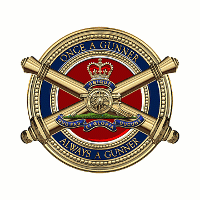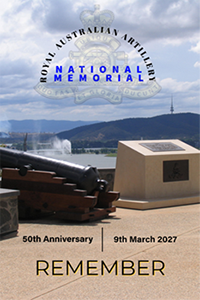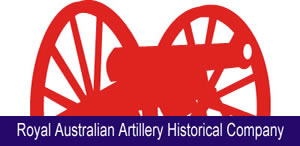 |
Brigadier Donald David Weir was born in Toowoomba on 19 May 1927. He attended Toowoomba Grammar and had a country upbringing. As a lad, he was keen on scouts and sports, a love which he continued throughout his life playing rugby, cricket, polo, squash all to a very high level all around the world. Don left school at the end of 1944 and was selected to attend the RMC Duntroon starting in February 1945.
Don graduated as a Lieutenant in the Royal Regiment of Australian Artillery (RAA) in December 1948 and, following a Young Officers Course at the School of Artillery, was posted to A Field Battery in Hiro Japan as part of the British Commonwealth Occupation Force. There he had plenty of opportunity and training ammunition to hone his gunnery skills as the Assistant Command Post Officer prior to his return to the School of Artillery in Manly for locating training and a subsequent posting to 1st Field Regiment RAA at Georges Heights. In 1950 he was appointed Adjutant of the Regiment, the first of four stints in this important appointment including one soon after at the School of Artillery where he first met his lifelong companion Anne.
|
They were married in October 1951. A year later Don was posted to Korea with 16 Field Regiment RNZA, where he served initially as a FOO and then again as the adjutant, this time of a regiment on active service. For his meritorious service in Korea Captain Don Weir was awarded an MBE. Following his return to Australia in 1952 he undertook his fourth appointment as adjutant with a posting to 3 Field Regiment RAA (a CMF regiment based in Karrakatta in WA).
Don’s gunnery training was then rounded off with an accompanied posting to the United Kingdom from October 1954 to December 1955 to complete a 12 month Gunnery Course. This time his training was in Air Defence, which was followed by a further posting back to the School of Artillery and promotion to Major as the Senior Instructor in the Air Defence Wing (under my Father who was then the CO/CI).
In 1959 Major Weir was off overseas again to the Pakistan Staff College in Quetta along with his larger family now comprising Anne and three children: Bryan who was born while he was in Korea plus Steve and Jenny who were born during the UK posting.
On return to Australia he held a short staff posting in Army Headquarters (AHQ) as the G2 Weapons Policy in the Directorate of Staff Duties prior to a return to the guns as Battery Commander of A Field Battery located at Holsworthy during 1961-62. This was followed by another gunner staff posting as the Brigade Major Royal Artillery (BMRA) at Headquarters 1st Australian Division.
Don was promoted to Lieutenant Colonel in May 1964 and appointed to a prestigious command as the Commanding Officer of the Corps of Staff Cadets at RMC Duntroon. I was in my second year at Duntroon at the time, and as the son of a Gunner and hoping to graduate into the RAA, I proudly remember him often walking strongly to his office along the other side of the parade ground proudly wearing his white lanyard, swinging his cane and accompanied by his dog. I also recall that as CO he was well respected by my fellow staff cadets. That appointment lasted until May 1966 when he transferred to a staff posting at AHQ and then overseas again in 1968 to Latimer in the UK to attend the Joint Services Staff College and undertake a series of visits to UK and US gunnery centres. On return to Australia in January 1969, he was appointed as the Commanding Officer/Chief Instructor of the School of Artillery at North Head, a posting for which all his broad technical training and gunner experience had prepared him well.
In mid 1970 Don was promoted to Colonel and appointed as the Deputy Commander 1st Australian Task Force in Nui Dat, Vietnam where I had the pleasure once again to admire his cool leadership and guidance. This time it was in an active service role. In recognition of his distinguished service in Vietnam he was promoted to the rank of Commander in the Order of the British Empire (CBE).
Colonel Weir returned to Australia and was appointed as the Director Royal Artillery (DRA) with the task of re-establishing the RAA for its likely role post Vietnam, but soon after in 1973 was promoted to Brigadier as the Assistant Chief of Personnel – Army. In this role one major task undertaken was a tri-service review of the Defence Force Retirement Benefit Scheme before he was posted overseas once again in 1974 to attend the Royal College of Defence Studies in London.
His final posting was as the Commander 6th Task Force based in Brisbane from 1975-1978.
Despite his potential and preparation for the highest command, Brigadier Weir decided to resign from the Army in March 1978 at the young age of 51 and to follow other callings. His eldest son Bryan describes his life after he decided to leave military as follows:
“(They) moved to a rural property at Lower Wonga in Queensland. There he and Mum raised cattle and brown snakes, as well as entertaining visiting sons and daughters, and a growing number of grandchildren. Dad became a water diviner, had a pet kangaroo, rode his horse to voting polls on election day and enjoyed seeing his cattle achieve top price at the local cattle sales.
In 1988, after 10 years as farmers, Mum and Dad decided the time had come to retire again and move closer to family. This time they moved to Matcham, where Mum supervised the construction of a house on a 5-acre block. This would become their HQ for the next 10 years, and we all have fond memories of family meals, swimming in the pool, playing short course golf around the house. Dad invariably won the golf. He had great touch with a 7 iron and knew where all the traps were! Mum and Dad moved to Taragal Glen at Erina, near Gosford NSW in 1998. Dad joined the bowling club and played bowls until his health prevented it, working behind the bar on occasions. He became involved in Legacy and served as President of the local branch. He took art classes and enjoyed painting.”
His service in Legacy has been reported as follows “Don Weir joined the Brisbane Water (NSW) Legacy Club in 1989, He was a past Chairman of the Family Welfare Committee, served as a member of the Board of Directors and was the President from 1999-2000. He was elected as a Reserve (Honorary) member in 2006 and remained so until his death “
Other articles about Brigadier Weir’s extensive service are included in the Royal Australian Artillery Historical Company (RAAHC) journal “Cannonball” Issue no 61 March 2006 and in the “History of the School of Artillery 1885 to 1996”.
Brigadier Don Weir was a fine soldier and a gunner of distinction. He attained broad technical and practical gunnery skills and command experience that were displayed in a wide range of varied command, staff and leadership appointments both in a peacetime environment and on active service. He was a gentleman and a fine sportsman, with strong values, who was much respected by all who served with him and loved by his family and the local community.
“For him the guns are now silent”. |








